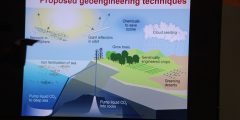Seeing the world as Ukraine
March 25, 2022
Humans have a profound ability to see something as something else. This enables us to create metaphors, mind and, in my view, consciousness. As the psychologist and philosopher of science Rom Harré once said: “You need an ‘as if’ to look at the world; you need an ‘as if’ to explain the world.” (p.c.) When …
Making Science Public 2021: End of year round-up of blog posts
December 18, 2021
We are coming to the end of a another pandemic year, and time seems to expand endlessness towards an uncertain horizon. That means quite a few of my blog posts this year were still devoted to covid and the pandemic, but I also wrote about genetics, climate change and some other incidental topics. As usual, …
Geoengineering metaphors: 2011 and 2021
October 29, 2021
I recently saw this call for papers for a Preconference at the 72nd Annual Conference of the International Communication Association on May 25, 2022 “The Science of Science Communication: Mapping the Field”. The invitation starts with this paragraph: “The beginning of the new century’s ‘Roaring 20s’ is determined by global crises around climate change, biodiversity …
Walls and covid
July 7, 2021
A few weeks ago, I wrote a brief blog post about the wall metaphor used during the pandemic. I approved of it, as it highlighted community action: the more individuals get vaccinated, the more protection there is for everybody – one brick doesn’t make a wall, but many do. The metaphor is now being used …
Walls, wars and waves: Some more thoughts on covid metaphors
May 21, 2021
The vaccination of the UK population has gone extremely well. There is still a race though between vaccinating against the covid virus and the emergence or introduction of new virus variants. However, fears of hospitals being overwhelmed by covid patients are dwindling. While this is going on, I noticed a metaphor that I had not …
Metaphors, metaphors, metaphors
April 2, 2021
Recently somebody asked me something about metaphor and I thought to myself, what the heck do you know about metaphor? Actually, not an awful lot, given all the stuff I have written about it, or rather the stuff that I have written which involves some sort of reference to metaphor. So, I started to make …
Loaded language
February 13, 2021
A lot has been written about the dangers of war metaphors used by politicians during the pandemic. But war metaphors are of course everywhere in political speech, where people fight elections, defeat opponents, battle against the odds. It is almost impossible to think about politics without thinking of it as a battle to be won. …
One day in twitterland: Metaphor, memory and amazement
November 29, 2020
People have all sorts of opinions about Twitter, but for me, so far, the experience has been positive; never more so than when it comes to ‘interdisciplinarity’. I work across the humanities, social science and natural sciences and follow people from what one may call all walks of science. I also work across science and …
An injection of metaphors
November 11, 2020
I hadn’t intended to write a blog post this week. So this is only an attempt to not let an important episode in the Covid and metaphor saga pass by without recording it for posterity. Others will have to do the difficult work of actually analysing what was going on. On 9 November, Monday afternoon, …
Firebreak
October 20, 2020
About a month ago, when I thought the government was about to announce a ‘circuit breaker’, I wrote a blog post about that metaphor. Now the Welsh government has announced a circuit breaker but has called it a ‘fire break’. That means that I now have to write a quick post about the ‘fire break’ …
Subscribe by email
About this blog
This blog promotes discussion of topics related to the research programme 'Making Science Public: Challenges and Opportunities'. Our purpose is not to 'make science public'. Instead, we want to study the opportunities that have emerged for science to be more openly practiced and debated, but also the challenges posed by making science public or by promoting the making public of science as a solution to a variety of problems in society and in politics.
This blog will report on these and other issues related to the Leverhulme funded research programme: Making Science Public: Challenges and Opportunities
Useful links
Recent Posts
 MSP bookmarks
MSP bookmarks
- Twitter May 8, 2017
- Social innovations in Europe #RRI November 3, 2015
- Harvey Graff, the undisciplinarian September 20, 2015
- Replacing Pesticides With Genetics August 31, 2015
- Addressing hazardous chemicals in the circular economy August 25, 2015
Categories
- antibiotics
- anticipatory governance
- artifical intelligence
- big data
- biotechnology
- citizen science
- Climate Change
- Climate Politics
- co-production
- coronavirus
- Creationism
- Definition of Science
- designer babies
- disease
- disease
- engineering
- epigenetics
- Food Security
- Food sovereignty
- gene drive
- genomics
- GM Food
- GMOs
- history of science
- Hype
- images and visualisations
- imaginaries
- Immigration
- Impact
- infectious diseases
- innovation
- interdisciplinarity
- Knowledge Society
- Language
- Markets
- Metaphors
- microbiome
- neoliberalism
- Neuroscience
- open access
- Personal Reflection
- Politics
- Public education
- public engagement with science
- public needs
- public participation
- public policy
- public service
- publics
- regulatory science
- Religion
- Republican Party
- research impact
- responsible innovation
- responsive research
- Richard Dawkins
- risk
- Scepticism
- Science
- Science and Government
- science and politics
- Science and Songs
- science communication
- Science Communication
- Science Fiction
- Science Policy
- Social science
- sociology
- space
- space exploration
- synthetic biology
- transparency
- Trust
- Uncategorized
- Uncertainty
- visualisation
- wonder










